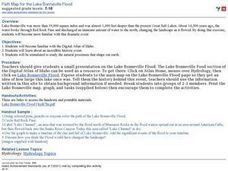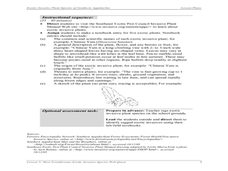Channel Islands Film
Island Rotation: Lesson Plan 1
How do scientists provide evidence to support the theories they put forth? What clues do they put together to create these theories? After watching West of the West's documentary Island Rotation class members engage in a series of...
Curated OER
A Look at the Geological History
In this geological history worksheet, students draw a cartoon strip to sequence how the North American continent grew. Students use information about continental drift to sequence events of how the different continents were formed.
Curated OER
Discovering Fall
Young scholars explore the American landscape during fall. After viewing paintings of fall, learners imagine themselves there and what it would be like. They then build an understanding of the painter's use of detail and color...
Curated OER
Non Native Species: English Ivy-Landscape Plant or Deadly Killer?
Young scholars study the impact that invasive species have on biodiversity and more natural areas.
Rainforest Alliance
How Do Jaguars and Howler Monkeys in Belize Depend on Us?
How does weather play a role in the lives of land and sea creatures? Find out with a instructional activity focused on habitats and the ways animals from different homes are connected. Here, learners explore how the life of a...
Curated OER
Non Native Species: English Ivy-Landscape Plant or Deadly Killer?
Students examine an area overrun by English Ivy. They explore how invasive species affect an ecosystem. They also study about the lack of biodiversity and how to measure it out in the field.
Curated OER
Path Map for the Lake Bonneville Flood
Pupils use a digital atlas of Idaho to explore the effects of the Lake Bonneville Flood. They become familiar with how floods shape our earth and change landscapes. Students graph a a timeline of the rise and fall of Lake Bonneville.
Curated OER
Sea Level and the Terrapin
Students study the habitat of the terrapin. In this terrapin lesson, students create a diorama of the habitat of the terrapin. Students also simulate how it would look if people moved into the area and how predators can threaten terrapin...
Curated OER
The Coyote Population: Kansas Prairies
Students discover animal lifestyles by researching their ecosystem. In this animal statistics lesson, students research the geography of Kansas and discuss the reasons why wild animals survive in the open Kansas fields. Students complete...
Curated OER
Rock Cycle: The Story of a Rock
Students examine the rock cycle by watching videos and then use creative storytelling techniques to tell the story of a rock as it undergoes geologic changes.
Curated OER
Natural Beauty: Looking Sharp
Pupils create covers for their "nature journals" using watercolor techniques and the artistic ideas of color, depth, and focal point. This lesson can be used in the Science or Art classroom and meets national standards for both.
Curated OER
Ecoregions of Texas
Seventh graders discuss why hunter-gatherers might have favored certain areas in which to live. In pairs, they research specific regions to examine in depth. Students present their eco-region vegetation findings (in this case Central...
Curated OER
Volcanoes: How Safe Are They?
Students explore the most dangerous volcanoes on Earth, plot their locations, and research different volcanic hazards.
Curated OER
Most Troublesome Exotic Invasive Plant Species Web Quest
Young scholars participate in a Web Quest activity in which they identify common exotic invasive plant species of the Southern Appalachian Region. After identifying the top 10 exotic invasive species, they choose one to research in depth.
Nature Conservancy
Nature Conservancy: Nash Prairie Preserve
Explore the beauty of America's prairies and examine efforts to preserve this vanishing part of America's landscape.














